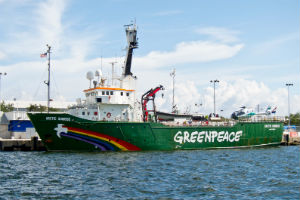An employee for Greenpeace International bet on the Euro and the organization lost to the tune of $5.2 million.
A loss of 3.8 million Euros ($5.2 million) was the result “a serious error of judgment by an employee in the International Finance Unit acting beyond the limits of their authority and without following proper procedures,” according to a statement issued by the organization. Headquartered in Holland and active in 40 countries, Greenpeace International entered into contracts to buy foreign currency at a fixed exchange rate while the Euro was gaining in strength but it resulted in a loss of 3.8 million euros against a range of other currencies.
Greenpeace International apologized to supporters “for the series of errors that led to the loss” and said it “every possible action is being taken to avoid the possibility of such a loss ever occurring again in the future.”
“While the staff member thought he was acting in the best interest of the organisation and there is no evidence of personal gain he has since been relieved of his position,” according to the statement. “We are continuing to explore all options in relation to the error and process failures. We are confident that steps already taken to improve financial controls mean this could not happen again.”
With investments that size and the level of risk associated with them, nonprofits should have controls in place so one person does not wield that much control, according to Brian Mittendorf, a professor of accounting and management information systems at The Ohio State University’s Fisher College of Business. “It’s surprising to see that,” he said, adding that it sometimes occurs in the private sector where a trader makes a risky bet that comes back to bite the organization but not among nonprofits.
“While the staff member thought he was acting in the best interest of the organisation and there is no evidence of personal gain he has since been relieved of his position,” according to the statement. “We are continuing to explore all options in relation to the error and process failures. We are confident that steps already taken to improve financial controls mean this could not happen again.”
In the statement, Greenpeace International said its latest annual report will be published soon and show a budget deficit of 6.8 million Euros ($9.2 million) for 2013, which includes the loss of 3.8 million Euros ($5.2 million) from the foreign currency exchange. Income will be reported as 72.9 million Euros ($99 million) out of a global budget of about 300 million Euros ($407 million).
To make up for the losses, Greenpeace said it will change planned “infrastructure investments” in the next two or three years but that no money would be taken from campaigns.
Greenpeace International’s 2012 annual report includes abbreviated financial statements that show investment and fixed assets totaling about 50 million Euro ($68 million), so a 4 million Euro loss ($5 million) would be about 7 percent of that total.
An investment pool that large should have internal controls or an external manager to handle investments, Mittendorf said. A more active investment approach typically necessitates some additional oversight, he said. Investing in currency swaps is probably a sign that an organization needs more internal controls or oversight by a third party. Nonprofits that are active to the point of alternative investments like derivatives, private equity, or real assets are advanced enough that they should have a strong risk management policy in place.
Organizations should have an investment and risk management strategy so a decision is made based not on one person’s thinking but a general, organization-wide policy of how an investment fits within its broader portfolio,” Mittendorf said.
It’s not uncommon for organizations to invest in things like interest rate swaps, not as a speculative tool but to offset risks that they have, he said. If a lot of assets are held in a particular currency, an organization might want to hedge the risk of that currency becoming devalued. “In isolation, these investments might look risky but as part of a broader portfolio, it might not be a risk at all.”
